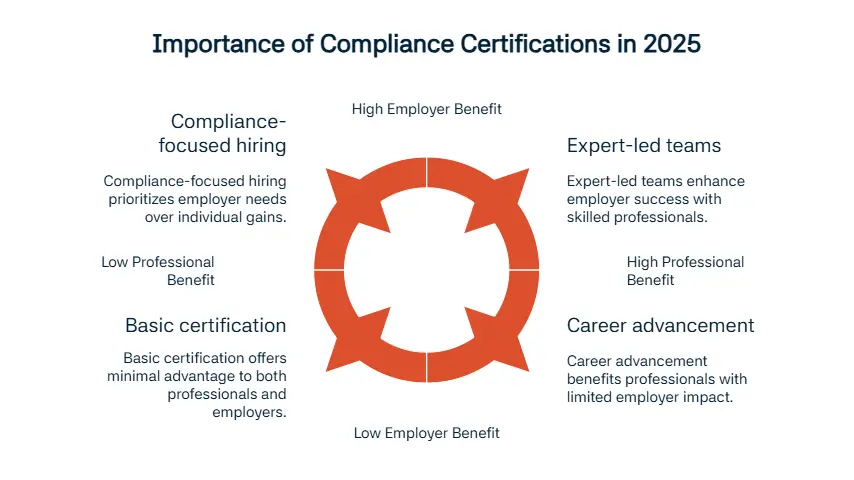What Are Compliance Certifications?
In this blog post, our focus will be certifications that help you reach compliance in 2025. Our readers will hopefully leave this post feeling more educated about the subject of compliance certifications. Compliance certifications are needed for proving that someone is knowledgeable in the area of the certification. These certifications help prove expertise in anti-money laundering (AML), sanctions compliance, and fraud prevention.
Why Do Compliance Certifications Matter in 2025?
Since laws are getting more complicated and global standards are set higher every day, professionals who can prove their credibility are needed to ensure compliance. These people get specialised training to receive these certifications. Having people who are experts in their field will help these teams immensely. These certifications help the professionals as well; proving your expertise with these certifications will surely bring you better career opportunities. Employers look for these certifications when reviewing candidates because it can help them focus on potential employees who have the experience and skills to succeed.

Top 12 Compliance Certifications in 2025
1. CAMS – Certified Anti-Money Laundering Specialist
The Certified Anti-Money Laundering Specialist certification is offered by ACAMS and it is widely known and well-credited as the best in AML certifications. To date, ACAMS has certified more than 140,000 professionals in over 200 jurisdictions and territories, and in 14 languages. This certification’s focus points are AML, Know Your Customer (KYC) processes, and transaction monitoring. It has a five-star rating throughout the globe. Many people consider the Certified Anti-Money Laundering Specialist (CAMS) to be the standard certification for AML practitioners
This certification is the best for compliance teams and AML officers since they need to make sure they are leading companies to compliance. CAMS is widely recognised worldwide, it is great to have this certification to show financial crime prevention expertise.
2. CFCS – Certified Financial Crime Specialist
The Certified Financial Crime Specialist certification is offered by ACFCS. This certification is covering areas like AML, sanctions, cybercrime, and fraud. It is great for teams who are cross functional, they can learn everything at once with this certification. A minimum of two years of professional experience in a financial crime area like compliance, anti-money laundering, fraud prevention, law enforcement, or regulatory work is needed for this certification. Professionals working in hybrid financial crime roles will find it ideal. It has a four out of five rating for worldwide recognition. The CFCS is largely recognised worldwide, it is known for offering a broad view of financial crime.
3. CFE – Certified Fraud Examiner
The Certified Fraud Examiner is given by the Association of Certified Fraud Examiners (ACFE). This certification is globally recpected and it especially covers fraud investigation, forensic techniques, and etchical practices. For example, auditors, internal control professional, and investigators who are working in accounting, auditing, or law enforcement get great benefits from acquiring this certification. According to the TealHQ, minimum of two years of professional experience in a field related to fraud detection, prevention, or investigation, such as auditing, loss prevention, law, or accounting is needed for this certification.
It is widely recognised worldwide, and great for those who are looking to get better at dealing with fraud.
4. CRCM – Certified Regulatory Compliance Manager
The Certified Regulatory Compliance Manager certification is given by the American Bankers Association (ABA). This certification is for those who are US-centrics specialising in regulatory compliance within banking. It especially focuses on lending, deposits, and other U.S. regutory requirements; it is great for compliance officers who work in the U.S. financial firms. A minimum of three years of experience in the compliance field within the financial services industry is needed for this certification.
It is barely recognised worldwide, but it is significant for those who are working in the U.S.
5. ICA Diploma in Anti Money Laundering
The ICA Diploma in Anti Money Laundering is offered by the International Compliance Association (ICA). This certification is great for those who are looking to get better dealing with AML, sanctions compliance, and risk management framerworks. We at Sanction Scanner can recommend this certification to our readers who are mid-to-senior level AML professionals that are looking to broaden their knowledge further.
It is largely recognised worldwide, and it is especially popular across Europe and Asia.
6. CGSS – Certified Global Sanctions Specialist
The Certified Global Sanctions Specialist certification is given by ACAMS. This certification is designed for professionals who are interested in sanctions compliance and geopolitical risk management. OFAC, United Nations, and European Union sanctions programs are covered in this certification. Officials who are sanctions analysts and trade compliance specialists can benefit greatly from acquiring this certification. The certification is fairly recognised worldwide.
7. CCEP – Certified Compliance & Ethics Professional
The Certified Compliance and Ethics Professional certification is offered by the Society of Compliance and Ethics (SCCE). This certification is for those who are focusing on corporate governance and the design and management of ethics programs. Ethics officers and compliance leaders will benefit from this certification the most. It is fairly recognised worldwide, and it is especially helpful for those who are working in the healthcare sector.
8. CKYCA – Certified Know Your Customer Associate
The Certified Know Your Customer Associate certification is given by the KYC Academy. This certification is more of a entry level certification for those who are looking to broaden their understanding of KYC and customer due diligence (CDD). Onboarding procedures can be made easier if the involved professionals have this certification. It is best for junior analysts or professionals starting their careers in AML and compliance.
It is barely recognised worldwide, but still really important for those who are looking to improve themselves for more advanced compliance roles.
9. ACAMS-RM – Risk Management for AML Professionals
The ACAMS-RM Risk Management for AML Professionals certification is provided by ACAMS. This certification focuses on designing and implementing risk-based AML programs. Senior compliance officers and auditors who are tasked with ensuring AML compliance is reached. It is fairly recognised worldwide, and the certification is helpful for those who are looking to integrate risk management into their programs.
10. Advanced CAMS-FCI – Financial Crime Investigations
The Advanced CAMS-Financial Crime Investigations certification is offered, once again, by ACAMS. This certification is best for CAMS certified officials who are looking to improve in complex financial crime investigations. Its main focuses are typologies, forensic investigation techniques, and advanced detection methods. It is fairly recognised worldwide.
11. ICA Certificate in Compliance
The ICA Certificate in Compliance is given by the International Compliance Assocation (ICA). This certification deals mainly with teaching more about core compliance frameworks and ethics. If you’re an entry-to-mid level compliance staff looking to improve your knowledge about compliance, this certification is for you. This certification is farily recognised worldwide, and it is a building block for more advanced compliance qualifications.
12. NASBA Certification – AML & Fraud Prevention
The last certification of the compliance 2025 is The NASBA Certification. The NASBA certification is offered by NASBA-accredited institiutions. Its main focuses are anti-money laundering within accounting and internal audit risk management. It is recommended for certified public accountants (CPAs), financial controllers, and other accounting professionals. While it is barely recognised worldwide, it’s still great for accountants and auditors who want to improve their compliance and fraud expertise.
The Summary of the Top Compliance Certification List of 2025
| Certification | Issuer | Focus Area |
| CAMS (Certified Anti-Money Laundering Specialist) | ACAMS | AML compliance fundamentals |
| CFCS (Certified Financial Crime Specialist) | ACFCS | Broad: AML, fraud, cyber, sanctions |
| CFE (Certified Fraud Examiner) | ACFE | Fraud detection and prevention |
| CRCM (Certified Regulatory Compliance Manager) | ABA | U.S. banking regulatory compliance |
| ICA Diploma in AML | International Compliance Association | Deep AML theory and application |
| CGSS (Certified Global Sanctions Specialist) | ACAMS | Sanctions compliance & screening |
| CCEP (Certified Compliance & Ethics Professional) | SCCE | Ethics, compliance program design |
| CKYCA (Certified Know Your Customer Associate) | GCI (Global Compliance Institute) | KYC onboarding and documentation |
| ACAM-RM (Risk Management for AML Professionals | ACAMS | AML risk assessment methodologies |
| CAMS-FCI (Advanced Financial Crimes Investigations) | ACAMS | Deep investigation techniques |
How to Choose the Right Compliance Certification?
We’ve given our readers a long and detailed list of the top certifications in 2025. But how can you choose what certification to go after? The first thing you should think of is your industry, and which certification would suit your sector best. Afterwards, your role is really important; the certification best for you might change depending on your expertise level and responsibilities. Your location in another thing to consider, since some of the certifications we mentioned above are mostly crucial for their specific region. Finally, your choice should reflect your career goals; make your decision while thinking about whether it will support your desired career path.
FAQ's Blog Post
Compliance certifications are credentials that show a person’s expertise in areas like AML, sanctions, or fraud prevention.
Professionals need compliance certifications to stay relevant in a world of evolving regulations and higher global standards.
Compliance officers, AML analysts, fraud investigators, and anyone working in risk or regulation should consider getting certified.
The CAMS certification by ACAMS is widely considered the gold standard for AML compliance experts.
Yes, the CKYCA and ICA Certificate in Compliance are great starting points for junior professionals.
The CFE by ACFE and CFCS by ACFCS are top choices for professionals focused on fraud detection and investigation.
You should choose based on your role, industry, region, and long-term career goals in compliance.





